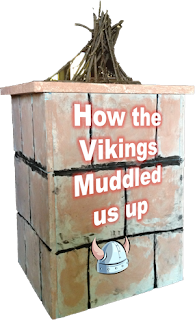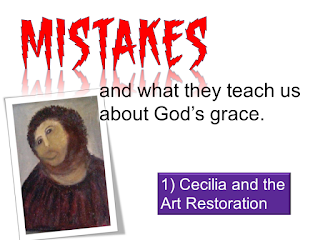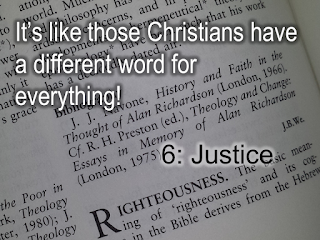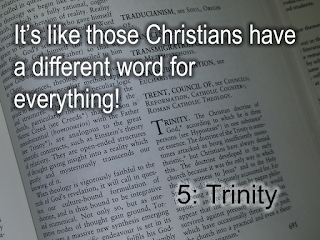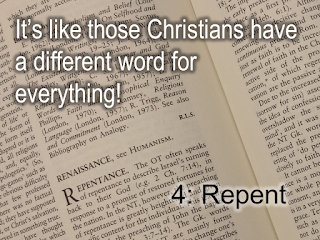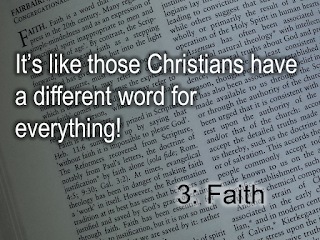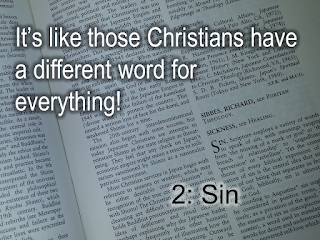W |
hy did Jesus have to die? That is, you might say, one of the most central questions of the Christian faith. And if you ask that question of most practicing Christians you will likely get an answer along the lines of this: “Jesus had to die for my sins,” or “Jesus had to die to save us” or “so that we could go to heaven.”
And some people will be happy enough with that answer. But every so often you’re going to come across a really annoying person like me who isn’t satisfied with that simple answer and starts to ask really some tough questions. “Well,” the annoying person says, “I thought that you said that this God of yours was all powerful – that he could do whatever he wanted. And I also thought you said that God was full of mercy and lovingkindness. If God wanted to forgive you and let you go to heaven, couldn’t he just do that? I mean, sure, you may have sinned but God doesn’t have to let something like that stand in his way if he wants to forgive you, does he? Why would the bloody and painful death of Jesus be needed for that?”
And if you ask questions like that long enough, you’ll eventually find someone who’ll give you a fuller explanation. And the standard Christian explanation these days goes like this: Yes, God is loving and merciful and wants very much to be forgiving to us but there is just one thing: God is also just. In fact, God is so just that he cannot simply let any injustice or sin slide without there being some sort of payment made. God’s justice has to be satisfied with due punishment.
And that’s where Jesus comes in. God looked around to find someone who could pay the price and take the punishment in our place so that he could forgive us and it turned out that only one person would do. Only someone who was perfectly innocent (and so didn’t need be punished for their own sins) would be able to play that role. So God turned to his only begotten son, Jesus, and chose to send him down, live a perfect life and die as an innocent man. Jesus’ suffering and death would be enough to satisfy God’s need for justice and therefore allow God to forgive us for our sins.
That, as I say, is the standard explanation these days. The name for it, in case you want to know, is the substitutionary theory of atonement. It is called that because the key element is that Jesus substitutes for us – takes our place and suffers the penalty that we deserve. It is a good theory, really. It makes good logical sense and is a compelling story. It is so compelling that many now think that it is the only way to understand the meaning of the death of Jesus and that it has always been how Christians thought. But that is not true.
The substitutionary theory of atonement has only been around for about 1000 years – only half the length of time that Christian faith has been around. Where did the theory come from a thousand years ago? Well, it happened like this:
The year 1066 ad is the only date that all English school girls and boys know off by heart – the most significant date in their country’s history. That was the year that England was invaded and conquered by the Normans who took over the entire government and local administration of the country. The Normans came from France and they spoke a unique dialect of French but they weren’t actually French. They were Norsemen – Viking raiders who had merely settled in France for a little while. And as Vikings, they had their own unique ideas about good government. Every Norman lord was master and judge of all within his domain. He settled all disputes, judged all crimes and punished every offender.
And it was not an easy thing to appear as someone accused before a Viking lord because they were particularly prickly when it came to judging people. Vikings were famous for many things, but I am afraid that mercy was not one of them. And so mercy was not something that was easily found in a Norman court. Viking lords were very protective of what they saw as justice. They felt that no offence – not even the smallest – could be pardoned without due payment being made in some form or another. Their judicial motto was, “justice must be satisfied.”
Now what, you might ask, could the Norman conquest of England possibly have to do with the Substitutionary Theory of Atonement? As it turns out, everything. About thirty years after the conquest, the second Norman king of England appointed a man named Anselm to be the Archbishop of Canterbury. And, a few years after that, Anselm of Canterbury wrote a book. He wrote it, he said, to defend the Christian faith against all those who would scoff at it – in particular the Jews and the Muslims. He called his book Cur Deus Homo in Latin. In English that translates as “Why did God become a human being.” In other words, he was trying to answer the question why did Jesus have to live as a man and why did he have to die.
The book is important because in that book Anselm gave for the very first time in history the answer that we’ve been talking about – that Jesus had to die in our place to satisfy God’s unyielding justice so that God could forgive us. Anselm invented the substitutionary theory of atonement. It is very interesting to note that, although Christianity had been around for about 1000 years before that, nobody had managed to come up with that theory until Anselm came along.
And there is a reason why only Anselm could have come up with that theory. As I said, the theory requires a very particular image of God – a God whose sense of justice is so inflexible that he can only forgive when he has been completely satisfied (even if he has to will the death of his only son to be satisfied). How is it that for the first thousand years of Christianity it never occurred to anybody that God would be that inflexible? And then Anselm came along and (as Archbishop of Canterbury) spent a lot of time in the courts of Viking lords watching them make their judgements. It’s not that hard to guess where his strange new view of God came from.
That’s why it seems to me that the Vikings have muddled up our understanding of the meaning of Jesus’ death. If we buy into Anselm’s explanation of why Jesus had to come, we end up with a God who resembles a Viking lord. And I realize that almost all of the images that we use to talk about God are based on one human model or another and that we can’t really even talk about God without saying, “Well, he’s kind of like this” or “kind of like that.” But I just think that there are some better models for talking about God without imagining him as a Viking lord. The Bible uses many images when it talks about God: a father, a near eastern king, a kind master, a loving mother (yes, that image is used of God in the Bible) and all of those sorts of people were much more ready to exercise mercy in their relationships than your average Viking lord. And it goes without saying that the Bible never describes God as a Viking lord. But somehow, with the substitutionary theory of atonement, that is the idea of God we end up with.
And so I suggest to you that it is time for us to get past our obsession with Anselm’s substitutionary theory of atonement. There are other ways of understanding what Jesus has truly accomplished for us without starting to imagine God as a Norman lord. The Bible does indeed talk about Jesus dying for us and about him dealing with the problem of sin for us but such talk has little to do with satisfying some Norman sense of justice.
Instead, the Bible most often talks about the death of Christ as a sacrifice. And sacrifice had nothing to do with substitution in the ancient world. When a family in the ancient world took its year-old calf up to the altar for a sacrifice, there was no sense in which they understood that that calf was somehow taking the place of a family member. Nor did they see the death of the animal as some sort of punishment taken in their place. That is why I wanted to take the time during this season of Lent to understand how sacrifice functioned in the ancient world.
On a practical level, it was all about providing a means for the people to safely eat meat once in a while. The sacrificial system provided a humane means of slaughtering animals and a professional, well-trained guild for safely butchering them. These people were called priests. And, most important, the system also provided a safe means of disposing of those parts of the animal that they would not or could not eat by burning them up on the altar.
But sacrifice was not just about meeting those practical needs. It also had a very important spiritual function. The sacrifice brought the worshippers together with one another and with their God. The shared sacrificial meal where the family ate the good cuts of the meat while God shared in the meal by means of the fat, bones, blood and other inedible parts that burned up on the altar was the basis of their relationship with their God. In the sacrifice they came to know their God in ways that would not have been possible otherwise.
And that is how I have come to see the death of Jesus – as a sacrifice. In his death Jesus does tackle the problem of our sin which is, at its foundation, a problem of separation between us and God. We had wandered far from God and didn’t know how to find our way back but Jesus’ death brought us back into relationship with God just like an ancient sacrifice renewed the ancient worshipper’s relationship with their God.
We shouldn’t think of Jesus’ death as a mere substitution – Jesus taking our place and suffering our punishment – because Jesus didn’t speak of it as substitution. He spoke of it as participation: “If any want to become my followers, let them deny themselves and take up their cross and follow me.” That is not Jesus’ responsibility in your place that is your responsibility in imitation of Jesus. If you want to be a follower of Jesus, you have to realize that that means following in the path that he has led. That is where the real transformation begins.
And, to attempt to answer Anselm’s question, “Why the God-Man,” why did Jesus have to become flesh and dwell among us, I think that the key answer is this: Jesus came to show us the grace and compassion and love of God. He knew that words weren’t going to be enough and so he had to show us what those things looked like. But the world cannot tolerate such love. The world cannot stand to be shown how wrong it is about everything. And so the response to Jesus was predictable. He was bound to end up on a cross sooner or later.
But Jesus took that terrible and tragic death and, with God’s help, transformed his death into something much more meaningful – a sacrifice – the kind of sacrifice that can renew any and all relationships. In particular, he transformed his terrible death into a sacrifice that is able to renew our relationship with the living God – a sacrifice that is effective for all times and for any person who participates in it by taking up their cross and following him.
